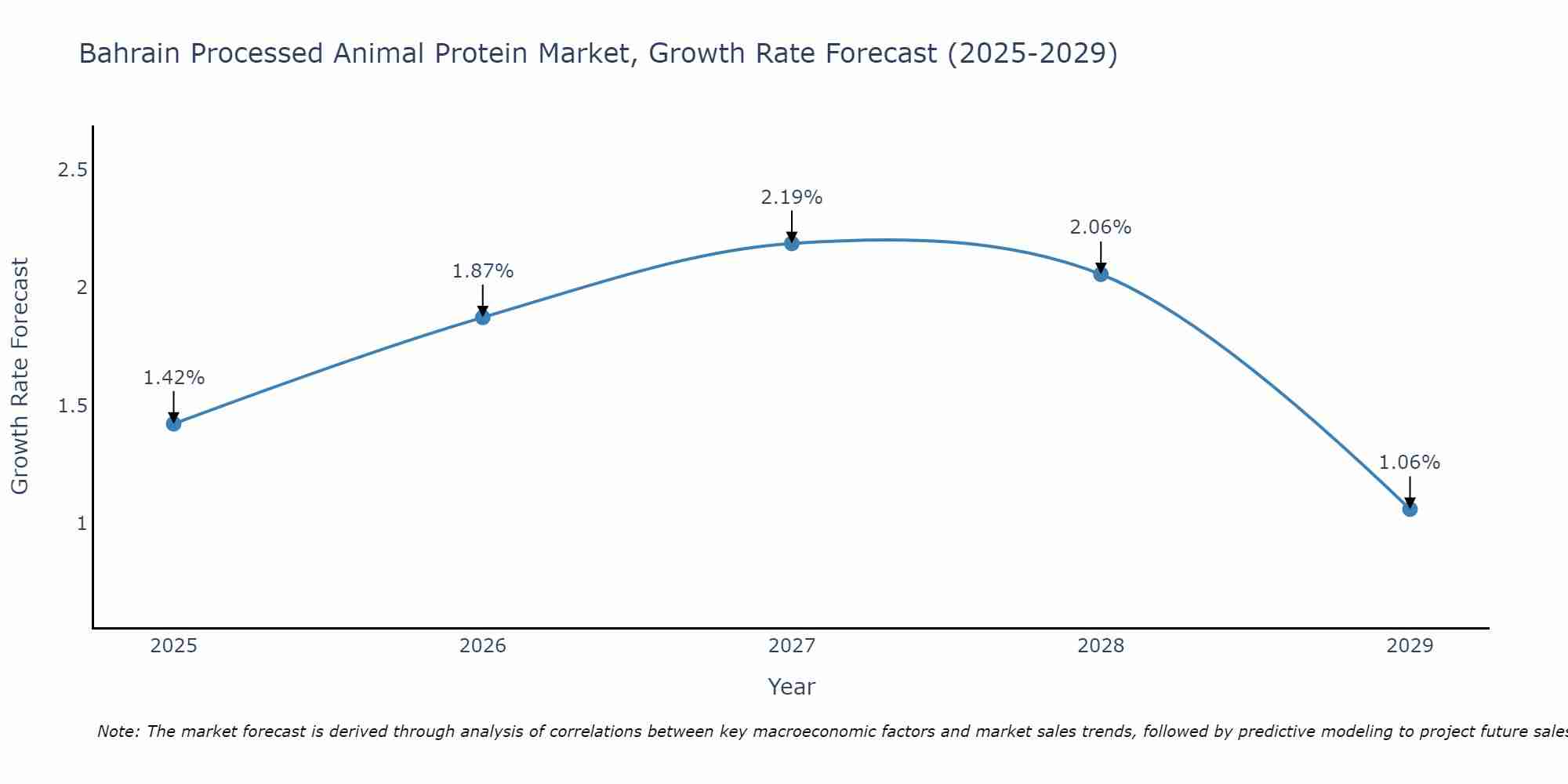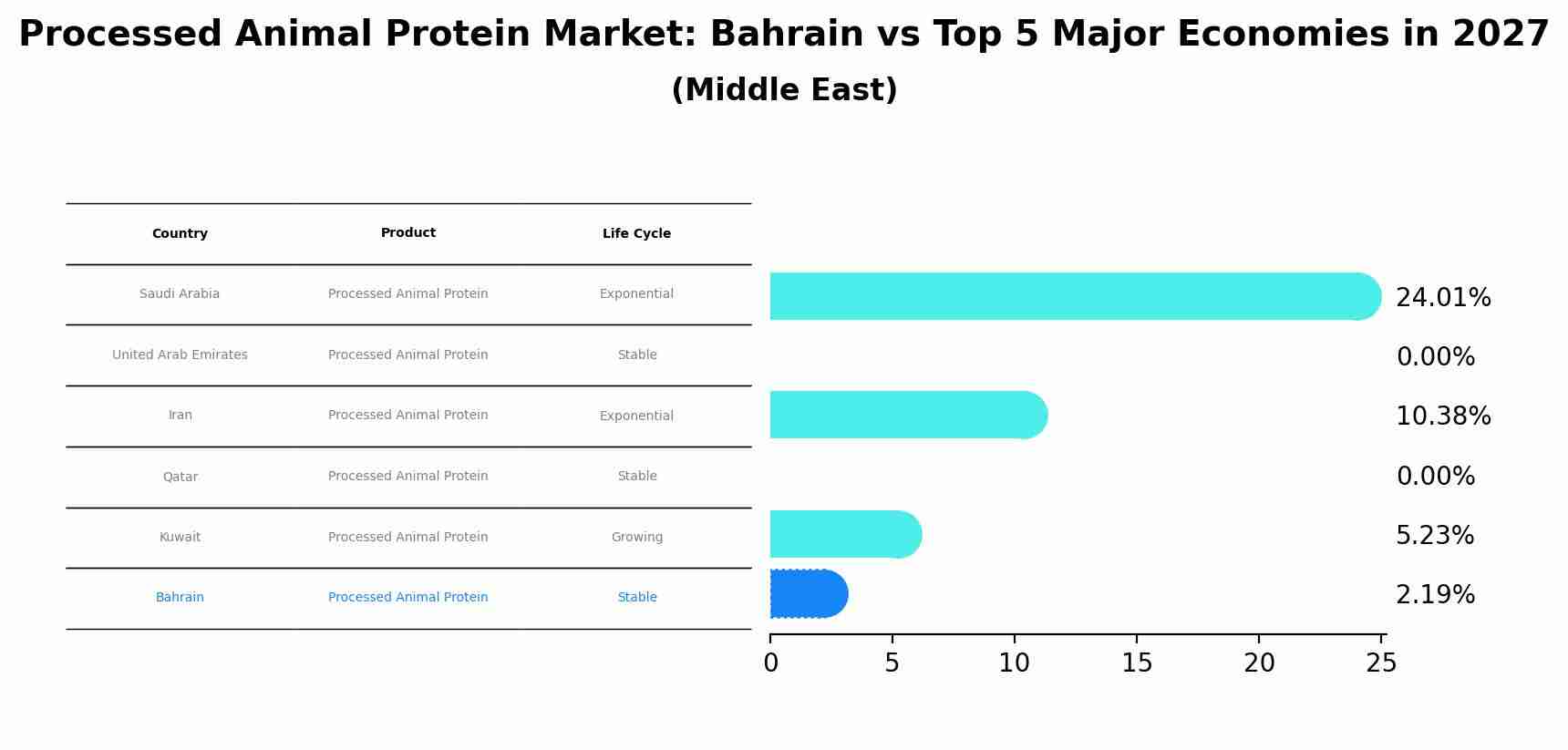Bahrain Processed Animal Protein Market (2025-2031) Outlook | Industry, Size, Revenue, Trends, Companies, Value, Share, Growth, Forecast & Analysis
| Product Code: ETC411940 | Publication Date: Oct 2022 | Updated Date: Apr 2025 | Product Type: Market Research Report | |
| Publisher: 6Wresearch | Author: Shubham Padhi | No. of Pages: 75 | No. of Figures: 35 | No. of Tables: 20 |
Bahrain Processed Animal Protein Market Size Growth Rate
The Bahrain Processed Animal Protein Market is projected to witness mixed growth rate patterns during 2025 to 2029. Starting at 1.42% in 2025, the market peaks at 2.19% in 2027, and settles at 1.06% by 2029.

Processed Animal Protein Market: Bahrain vs Top 5 Major Economies in 2027 (Middle East)
The Processed Animal Protein market in Bahrain is projected to grow at a stable growth rate of 2.19% by 2027, highlighting the country's increasing focus on advanced technologies within the Middle East region, where Saudi Arabia holds the dominant position, followed closely by United Arab Emirates, Iran, Qatar and Kuwait, shaping overall regional demand.

Bahrain Processed Animal Protein Market Synopsis
Processed animal protein is primarily used in animal feed formulations in Bahrain. The market is regulated to meet international safety and quality standards and relies heavily on imports. Fishmeal and meat-bone meal are common forms used in aquaculture and poultry feed.
Trends of the market
Bahrains processed animal protein market supports the feed industry, especially for poultry and aquaculture. These proteins are crucial for enhancing feed efficiency and livestock health. Most supplies are imported, with strict regulatory standards to ensure quality and safety. The demand is increasing in tandem with local livestock farming and fish farming activities. Sustainability concerns are prompting interest in processed proteins derived from by-products and waste reduction strategies in animal farming.
Challenges of the market
Processed animal protein (PAP) in Bahrain is constrained by regulatory restrictions, particularly those related to animal feed and food safety. Religious considerations also limit its application, especially if derived from non-halal sources. Consumer apprehension around meat by-products and disease transmission further challenges adoption. The lack of domestic rendering facilities increases dependency on imports. As a result, the market remains underdeveloped compared to global standards.
Investment opportunities in the Market
Bahrains processed animal protein market is emerging in relevance due to its use in livestock feed, aquaculture, and pet food applications. With rising protein consumption and demand for cost-effective, sustainable feed ingredients, there is room for investment in production, import, and local processing of meat and bone meal (MBM), poultry meal, and other animal-derived protein sources. The governments interest in food security and animal husbandry modernization supports the development of domestic processing or rendering units. Investors can also explore value-added product lines like high-protein pet food and fish meal for aquaculture. Quality control, traceability, and halal compliance are essential to market entry. Additionally, Bahrains port access allows for convenient regional export to other GCC countries looking to diversify feedstock supplies.
Government Policy of the market
The processed animal protein market in Bahrain is crucial for the livestock feed industry and pet food production. Government policies in Bahrain focus on ensuring that processed animal proteins meet health and safety standards, particularly in animal feed products. The Bahrain Food and Drug Authority (BFDA) ensures that these proteins are free from contaminants and are suitable for consumption by animals. The government also supports the development of sustainable practices in animal protein production, which includes regulations on waste disposal and animal welfare. With a rising demand for quality animal feed, the processed animal protein market is expected to grow, driven by both local and regional needs.
Key Highlights of the Report:
- Bahrain Processed Animal Protein Market Outlook
- Market Size of Bahrain Processed Animal Protein Market, 2024
- Forecast of Bahrain Processed Animal Protein Market, 2031
- Historical Data and Forecast of Bahrain Processed Animal Protein Revenues & Volume for the Period 2021 - 2031
- Bahrain Processed Animal Protein Market Trend Evolution
- Bahrain Processed Animal Protein Market Drivers and Challenges
- Bahrain Processed Animal Protein Price Trends
- Bahrain Processed Animal Protein Porter's Five Forces
- Bahrain Processed Animal Protein Industry Life Cycle
- Historical Data and Forecast of Bahrain Processed Animal Protein Market Revenues & Volume By Source for the Period 2021 - 2031
- Historical Data and Forecast of Bahrain Processed Animal Protein Market Revenues & Volume By Poultry for the Period 2021 - 2031
- Historical Data and Forecast of Bahrain Processed Animal Protein Market Revenues & Volume By Pork for the Period 2021 - 2031
- Historical Data and Forecast of Bahrain Processed Animal Protein Market Revenues & Volume By Beef for the Period 2021 - 2031
- Historical Data and Forecast of Bahrain Processed Animal Protein Market Revenues & Volume By Others for the Period 2021 - 2031
- Historical Data and Forecast of Bahrain Processed Animal Protein Market Revenues & Volume By Form for the Period 2021 - 2031
- Historical Data and Forecast of Bahrain Processed Animal Protein Market Revenues & Volume By Dry for the Period 2021 - 2031
- Historical Data and Forecast of Bahrain Processed Animal Protein Market Revenues & Volume By Liquid for the Period 2021 - 2031
- Bahrain Processed Animal Protein Import Export Trade Statistics
- Market Opportunity Assessment By Source
- Market Opportunity Assessment By Form
- Bahrain Processed Animal Protein Top Companies Market Share
- Bahrain Processed Animal Protein Competitive Benchmarking By Technical and Operational Parameters
- Bahrain Processed Animal Protein Company Profiles
- Bahrain Processed Animal Protein Key Strategic Recommendations
Frequently Asked Questions About the Market Study (FAQs):
- Single User License$ 1,995
- Department License$ 2,400
- Site License$ 3,120
- Global License$ 3,795
Search
Related Reports
- Vietnam System Integrator Market (2025-2031) | Size, Companies, Analysis, Industry, Value, Forecast, Growth, Trends, Revenue & Share
- ASEAN and Thailand Brain Health Supplements Market (2025-2031) | Strategy, Consumer Insights, Analysis, Investment Trends, Opportunities, Growth, Size, Share, Industry, Revenue, Segments, Value, Segmentation, Supply, Forecast, Restraints, Outlook, Competition, Drivers, Trends, Demand, Pricing Analysis, Competitive, Strategic Insights, Companies, Challenges
- ASEAN Bearings Market (2025-2031) | Strategy, Consumer Insights, Analysis, Investment Trends, Opportunities, Growth, Size, Share, Industry, Revenue, Segments, Value, Segmentation, Supply, Forecast, Restraints, Outlook, Competition, Drivers, Trends, Demand, Pricing Analysis, Competitive, Strategic Insights, Companies, Challenges
- Europe Flooring Market (2025-2031) | Outlook, Share, Industry, Trends, Forecast, Companies, Revenue, Size, Analysis, Growth & Value
- Saudi Arabia Manlift Market (2025-2031) | Outlook, Size, Growth, Trends, Companies, Industry, Revenue, Value, Share, Forecast & Analysis
- Uganda Excavator, Crane, and Wheel Loaders Market (2025-2031) | Strategy, Consumer Insights, Analysis, Investment Trends, Opportunities, Growth, Size, Share, Industry, Revenue, Segments, Value, Segmentation, Supply, Forecast, Restraints, Outlook, Competition, Drivers, Trends, Demand, Pricing Analysis, Competitive, Strategic Insights, Companies, Challenges
- Rwanda Excavator, Crane, and Wheel Loaders Market (2025-2031) | Strategy, Consumer Insights, Analysis, Investment Trends, Opportunities, Growth, Size, Share, Industry, Revenue, Segments, Value, Segmentation, Supply, Forecast, Restraints, Outlook, Competition, Drivers, Trends, Demand, Pricing Analysis, Competitive, Strategic Insights, Companies, Challenges
- Kenya Excavator, Crane, and Wheel Loaders Market (2025-2031) | Strategy, Consumer Insights, Analysis, Investment Trends, Opportunities, Growth, Size, Share, Industry, Revenue, Segments, Value, Segmentation, Supply, Forecast, Restraints, Outlook, Competition, Drivers, Trends, Demand, Pricing Analysis, Competitive, Strategic Insights, Companies, Challenges
- Angola Excavator, Crane, and Wheel Loaders Market (2025-2031) | Strategy, Consumer Insights, Analysis, Investment Trends, Opportunities, Growth, Size, Share, Industry, Revenue, Segments, Value, Segmentation, Supply, Forecast, Restraints, Outlook, Competition, Drivers, Trends, Demand, Pricing Analysis, Competitive, Strategic Insights, Companies, Challenges
- Israel Intelligent Transport System Market (2025-2031) | Strategy, Consumer Insights, Analysis, Investment Trends, Opportunities, Growth, Size, Share, Industry, Revenue, Segments, Value, Segmentation, Supply, Forecast, Restraints, Outlook, Competition, Drivers, Trends, Demand, Pricing Analysis, Competitive, Strategic Insights, Companies, Challenges
Industry Events and Analyst Meet
Our Clients
Whitepaper
- Middle East & Africa Commercial Security Market Click here to view more.
- Middle East & Africa Fire Safety Systems & Equipment Market Click here to view more.
- GCC Drone Market Click here to view more.
- Middle East Lighting Fixture Market Click here to view more.
- GCC Physical & Perimeter Security Market Click here to view more.
6WResearch In News
- Doha a strategic location for EV manufacturing hub: IPA Qatar
- Demand for luxury TVs surging in the GCC, says Samsung
- Empowering Growth: The Thriving Journey of Bangladesh’s Cable Industry
- Demand for luxury TVs surging in the GCC, says Samsung
- Video call with a traditional healer? Once unthinkable, it’s now common in South Africa
- Intelligent Buildings To Smooth GCC’s Path To Net Zero













